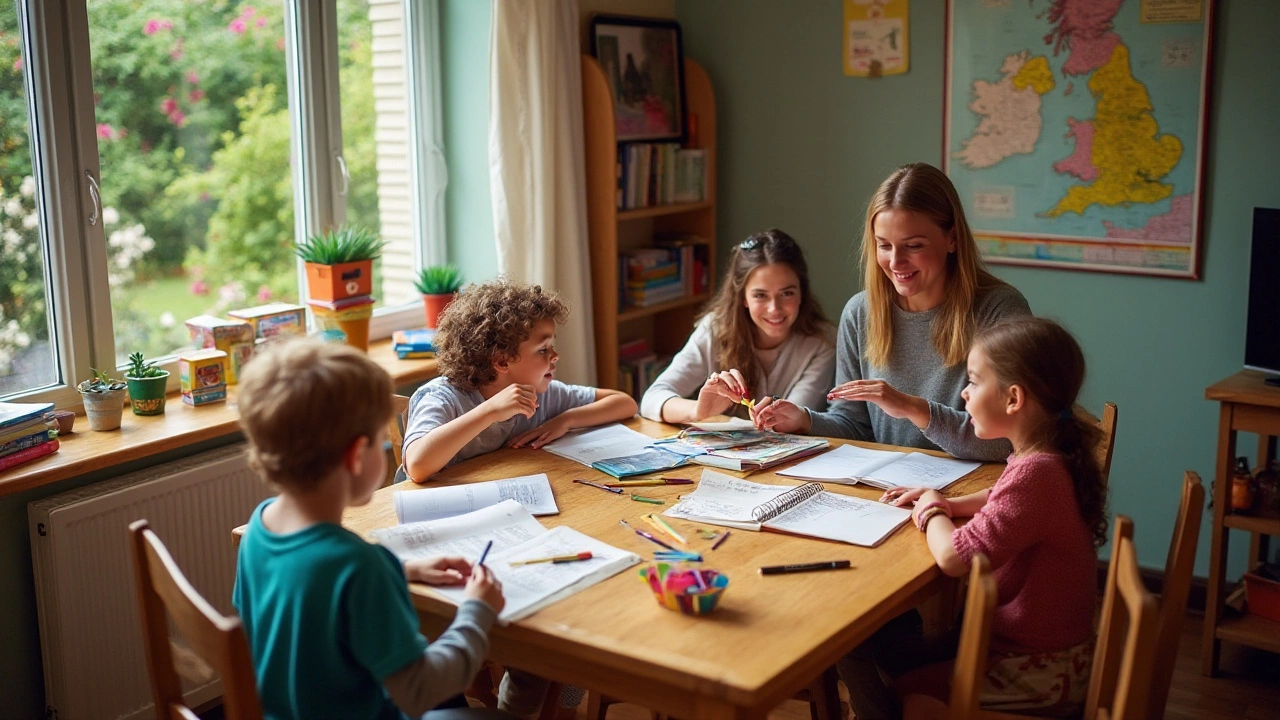Homeschooling has emerged as an intriguing and popular alternative to the conventional schooling system, especially in recent years. As families across the globe embrace the flexibility and individuality that homeschooling offers, the question arises: just how successful is it? In this exploration, we will uncover the potential and challenges of homeschooling as an educational path.
With personalized learning plans, parents are taking the reins to craft unique educational experiences for their children, allowing for an education that adapts to individual needs, interests, and learning styles. As we delve deeper, we'll investigate the academic successes, social implications, and common hurdles faced by those who choose this path. This journey into the world of homeschooling aims to provide a comprehensive look into its effectiveness and why it has become a favored choice among many families today.
- Understanding Homeschooling
- Growing Popularity and Trends
- Academic Performance
- Social Development
- Challenges Faced by Homeschoolers
- Tips for a Successful Homeschool Experience
Understanding Homeschooling
Homeschooling is a distinctive learning approach where parents take on the role of teachers, crafting academic experiences tailored to their children's unique needs and interests. This educational model has evolved significantly over the years, drawing both praise and skepticism from educators, parents, and policymakers. At its core, homeschooling allows for a customizable education, no longer confined to the conventional four walls of a classroom. This freedom permits parents to choose curricula that align not only with educational standards but also with their personal values and beliefs. As of 2023, it's estimated that over 3.7 million children in the United States are homeschooled, a stark reminder of its growing popularity among diverse communities. Unlike traditional schools where standardized testing often dictates the pace and focus of lessons, homeschooling facilitates a more fluid learning approach, allowing or even encouraging students to delve deeper into subjects of passion.
Beyond the ability to adapt curriculum, homeschooling is often chosen for its flexibility. This flexibility manifests in numerous forms, such as the pace of learning, allowing students to linger on complex topics until mastery is achieved, or to accelerate when lessons are easily grasped. This custom pace helps maintain enthusiasm for learning, as children are less likely to become bored or frustrated. A multitude of homeschooling methods exist, such as the classical approach, which emphasizes rhetoric and logic, or the unschooling method that promotes an unstructured, student-led learning process. Parents are increasingly utilizing a blend of techniques to find what works best for their children. It is important to note that homeschooling is not a one-size-fits-all model, and continuous adaptation is often necessary to meet educational goals and the ever-evolving interests of the students themselves.
Families embark upon the homeschooling journey for a variety of reasons. Some are driven by the desire for a more focused, individualized education that traditional school settings may struggle to provide. Others seek to incorporate religious instruction interwoven with academia, something public schools cannot offer. Safety is another concern for many families choosing homeschooling, particularly when news of bullying or school violence is prevalent. According to the National Center for Education Statistics, 34% of homeschool families cite "a safe environment" as a primary reason for homeschooling. Dr. Brian D. Ray, an established researcher on homeschooling, states, "The growing body of research supports the idea that homeschooled students often outperform their peers academically and are sometimes more engaged in civic and communal activities."
Such evidence has fostered a shift in perception, where once homeschooling was considered unconventional, now it's gaining legitimacy as a valuable educational option.
Growing Popularity and Trends
Homeschooling as an educational approach has seen significant growth worldwide, reflecting a shift in how parents perceive traditional education structures. Over the past few decades, the number of families choosing the homeschooling option has skyrocketed. This rise is driven by a multitude of factors such as dissatisfaction with the traditional education system, the desire for a tailored learning experience, and concerns about school safety and bullying. In the United States alone, estimates from the National Center for Education Statistics indicate that approximately 3.7 million students were homeschooled in the 2020-2021 academic year, marking a sharp increase compared to previous years. This surge can partially be attributed to the global pandemic, which prompted families to reassess their children's education and explore new possibilities.
One of the most appealing aspects of homeschooling is its flexibility in educational methodologies. Parents and educators are no longer confined to a one-size-fits-all curriculum; instead, they have the freedom to craft learning plans that cater specifically to a child's strengths and interests, whether that involves using specific coursework from different educational platforms, utilizing project-based learning, or incorporating worldly experiences. As a result, students who are homeschooled often report higher satisfaction rates and a greater enthusiasm for learning. According to an article by Dr. Brian D. Ray, President of the National Home Education Research Institute, homeschooled children typically score 15 to 30 percentile points higher on standardized tests than their public school peers.
The technological advancements of the 21st century have equipped homeschooling families with access to a multitude of resources and communities online. Virtual study groups, online courses, and digital textbooks have made it feasible for parents to provide quality education at home, often collaborating in local co-ops or global networks to enrich their children's learning experience. The ease of connecting with various educational communities has made it an enticing option for those looking to individualize their children's educational journey. On the digital frontier, platforms like Khan Academy, Coursera, and others offer courses that supplement standard curricula, enabling students to pursue a wide array of subjects, such as coding, foreign languages, and even AP courses.
Although traditional schooling typically follows a structured, regimented routine, the essence of homeschooling lies in its unconventional and adaptive approach. This educational method has given rise to various styles, including unschooling, classical education, and even forest schools. Each of these approaches highlights different aspects of learning, aiming to foster a more comprehensive and engaging educational experience. For instance, unschooling places an emphasis on self-directed learning where children follow their natural curiosities with guidance from parents. Meanwhile, classical education adheres to the trivium — grammar, logic, and rhetoric — in teaching foundational skills across subjects.
The popularity of homeschooling has also opened doors for diverse cultural and religious communities who seek an education that aligns with their values and lifestyle. Parents are able to synchronize academic learning with cultural teachings or religious practices, creating a harmonious balance that resonates with their beliefs. This trend is evident in diverse communities across the world, each crafting educational experiences that include both scholastic and personal upbringing elements. The inclusiveness and adaptability of homeschooling attract more families seeking to cultivate an educational environment reflective of their identity.
"The homeschooling movement is multifaceted, with families choosing this path for varied reasons, from dissatisfaction with the traditional schooling system to the flexibility it offers," notes Dr. Michael Hines, an educational researcher focused on alternative education methods.Such flexibility and the ability to cater to the specific needs and values of each family are why homeschooling continues to grow and why many educational experts foresee its role in reshaping the educational landscape in years to come.

Academic Performance
In the realm of education, the academic performance of students is a cornerstone topic, and homeschooling brings an interesting perspective to it. Many critics of homeschooling have often questioned whether those who learn outside the traditional classroom can match or exceed the scholastic achievements of their peers in conventional schools. On examining the available data, it's fascinating to see the trends that unfold. Various studies indicate that homeschooled students often achieve higher scores on standardized tests compared to their traditionally schooled counterparts. Such performance is not merely limited to a single subject but spans across math, reading, and even science. The reasons behind these achievements often point to the personalized learning approaches and dedicated attention that homeschooling facilitates.
In evaluating the success of homeschooling academically, one must consider the tailored instructional methods that parents or tutors employ. This setting allows them to focus on the child’s strengths and address weaknesses without the constraints typically faced by large classroom sizes. For instance, a child struggling with algebra can revisit lessons and exercises until mastery is achieved, cultivating a comprehensive understanding far beyond memorization. Moreover, research shows that homeschoolers are almost twice as likely to take college-level AP classes during high school, suggesting a strong foundational education. In terms of college readiness and acceptance, admissions officers are increasingly acknowledging and accepting homeschooled students who bring diversity and self-driven learning experiences. It's been noted that their unique background often translates into a higher degree of independence and critical thinking skills, which are invaluable in higher education.
A 2015 study conducted by the National Home Education Research Institute found that homeschooled students score an average of 15 to 30 percentile points above public -school students on standardized academic achievement tests.
While it can be challenging to capture all the nuances of each child’s learning journey, homeschooling benefits from a flexibility that allows engagement with various learning materials and resources — from online courses to community classes and interest-based projects. This diverse exposure can enhance critical-thinking skills and deepen knowledge while making learning an enjoyable and dynamic process. Parents who take on the role of educators often report observing firsthand how their input and teaching directly impact their children's understanding and retention of knowledge, providing real-time feedback and adjustments to the curriculum as needed. In the long run, this results in learners who are not only adept in academics but also equipped with a proactive attitude towards life-long learning.
Social Development
The topic of social development is often at the forefront of discussions around homeschooling. Many parents wonder how children educated at home fare in terms of social skills and interactions. It's a common misconception that homeschooled children may lack social exposure. However, studies have shown that this isn't necessarily the case. In fact, researchers like Dr. Brian Ray from the National Home Education Research Institute assert that homeschooled children often engage in a wider range of social experiences. They participate in community service, sports, and extracurricular activities, which allows them to interact with diverse age groups and backgrounds.
Homeschooling parents tend to be proactive in ensuring their children are socially engaged. They organize group activities, field trips, and meet-ups with other homeschooling families, which provide robust opportunities for socialization. A distinct advantage here is the flexibility to explore varied environments beyond the traditional classroom. Anecdotal reports suggest that these children often become adept at conversing comfortably with both peers and adults. Some experts, such as Patricia Lines, even argue that the interaction with mixed-age groups fosters unique social skills.
Structured Activities and Groups
Structured group activities often play a pivotal role in social development for homeschoolers. Families frequently enroll their children in activities such as martial arts, music lessons, theater productions, and sports leagues, where collaboration and teamwork are emphasized. These environments provide specific social scenarios for children to navigate, promoting negotiation and communication skills. What’s fascinating is that these activities are not just limited to peer interactions but also involve collaborative efforts with mentors and coaches, from whom children may learn different perspectives and approaches to problem-solving.
"Homeschooled children often participate in social activities beyond the classroom, providing them with a broad range of social experiences as diverse as those found in traditional school settings," states Dr. Ray in his findings.
It's crucial to consider how these structured interactions outside the home contribute significantly to a child’s confidence and ability to form relationships. Peer interaction, in shared interests and team objectives, often leads to meaningful friendships. A child learning in such varied environments often develops social adaptability, an essential skill in our ever-changing world. These elements create dynamic social developments that are sometimes missed in conventional education frameworks.

Challenges Faced by Homeschoolers
Undoubtedly, homeschooling offers significant advantages, but it is not without its own set of challenges. Parents and learners alike often encounter a variety of obstacles, from gaining access to resources to addressing socialization needs. One notable challenge is ensuring a well-rounded education, as parents must often fill multiple roles from being a subject matter expert to a guidance counselor. The necessity to tailor curriculums to suit individual learning styles can become a daunting task without sufficient guidance or support, leading many families to search for community networks or online platforms that can offer advice and resources.
Moreover, the need for social interaction is critical for the overall development of children, sparking concerns among parents about the adequacy of traditional schooling environments in fostering essential social skills. While homeschoolers today have more opportunities than ever before to engage with peers through extracurricular activities, clubs, and co-ops, scheduling logistics can sometimes limit these interactions. Parents must actively seek out collaborative groups or community-led classes to mitigate this issue, ensuring their children have the opportunity for meaningful social engagement.
Another significant challenge faced is maintaining the discipline required for effective learning at home. Unlike structured school environments, the informal setting of a home can easily lead to distractions if not managed properly. Families must develop and adhere to a consistent schedule to instill a sense of routine and responsibility. Additionally, the financial aspect cannot be underestimated; while homeschooling can be more affordable than private schooling, it often requires one parent to forgo employment, impacting household income. Resources needed for effective teaching—such as books, educational materials, and sometimes specialized tutors—add to the financial burden, compelling families to carefully budget their expenses.
Finally, dealing with external perception and legal regulations can pose another layer of difficulty. Some regions have specific laws governing homeschooling, necessitating in-depth understanding and adherence by parents to avoid compliance issues. Others may face judgment or skepticism from their communities regarding their chosen educational path. Addressing these perceptions requires confidence in the decision to homeschool and, often, evidence of its success through academic achievements or student portfolios. Despite these hurdles, an increasing number of families are finding ways to navigate these challenges effectively, forging a successful path through homeschooling. As one veteran homeschooling parent notes,
"The key to success is flexibility and perseverance; it's about working together with your child and community to discover what suits them best."
Tips for a Successful Homeschool Experience
Embarking on the homeschooling journey can be thrilling yet daunting for many families. While the freedom to tailor education to fit a child's unique needs is exhilarating, it also brings its fair share of challenges. A successful homeschool experience hinges on a well-thought-out approach and adopting effective strategies. The first step is crafting a conducive learning environment that fosters curiosity and motivation. This means carving out a dedicated learning space that is quiet yet inspiring, equipped with all the necessary materials. A clutter-free area can make a significant difference in maintaining focus and productivity. Establishing a consistent schedule is just as crucial. Children thrive on routine as it gives them a sense of security and helps manage time efficiently. Balance is the keyword here; while structure is important, there should be room for spontaneous learning opportunities as well.
Next, consider creating a curriculum that is both engaging and comprehensive. A major advantage of homeschooling is the flexibility to customize what and how subjects are taught, so take full advantage of this liberty. Incorporate a mix of learning techniques that cater to visual, auditory, and kinesthetic learning styles. Experiment with interactive tools, such as educational games and online resources, which can liven up traditional methods. There's also beauty in integrating real-world experiences into the curriculum. Regular field trips to museums, science centers, and historical sites enrich learning beyond the confines of textbooks, encouraging children to make connections between lessons and the outside world. Encourage curiosity - allow your child's interests to guide certain learning segments, which can lead to deeper engagement and love for learning.
Socialization often raises concerns for homeschooling parents, yet it is entirely manageable with some creativity. Active participation in local homeschool groups or co-ops can offer children interaction opportunities with their peers. Such gatherings also provide shared learning experiences, from science experiments to art sessions, creating a sense of community. Engage your children in extracurricular activities like sports, music classes, or language clubs, allowing them to develop friendships and essential social skills. A crucial component to a successful homeschool journey is continual assessment and flexibility. Regularly evaluate the child’s progress and adapt teaching methods as needed. The beauty of homeschooling lies in its adaptability, so keep an eye out for what works and what doesn’t. This dynamic approach allows you to fine-tune the educational experience to best suit your child’s evolving needs.
"Homeschooling allows you to adapt to your child's particular needs, and that means success can come faster and easier." – Education Consultant Mary Pierson
The support of a network cannot be emphasized enough. It is beneficial to connect with other homeschooling families for advice, resources, and emotional encouragement. Consider attending homeschooling conventions or joining online forums to knowledge-share and receive guidance from seasoned homeschoolers. Learning is an ongoing journey for both parent and child. As you navigate this path, don’t shy away from seeking out professional advice or enrolling in homeschool workshops to enhance your teaching skills. Mistakes are part of the learning curve; embrace them and learn alongside your child. This shared experience not only enriches your teaching strategies but strengthens the parent-child bond.
In conclusion, embracing a flexible and customized approach, actively seeking social and community engagements, and maintaining open lines of communication with your child and fellow homeschoolers can make all the difference. With these strategies in place, you set a strong foundation for a truly rewarding homeschooling journey that nurtures both academic success and personal growth.

